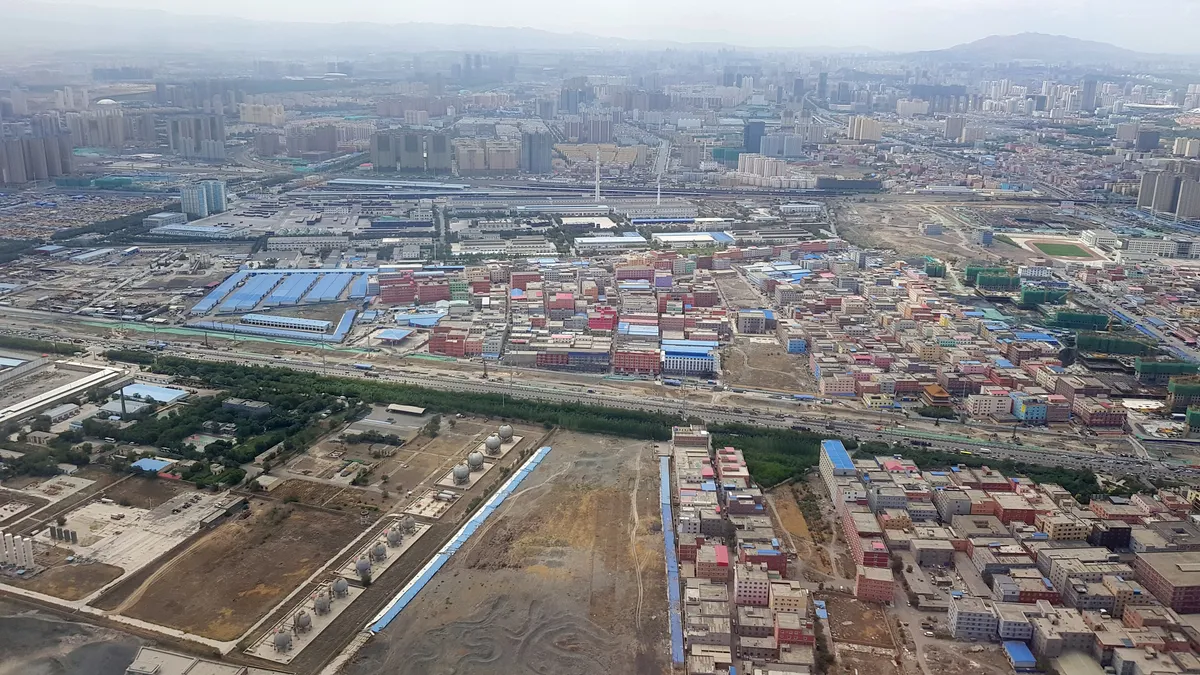Dive Brief:
- Customs and Border Protection on Wednesday issued a sweeping withhold release order for all cotton and tomato products originating in the Uighur Autonomous Region of China's Xinjiang Province due to documented forced-labor practices including debt bondage, restriction of movement, isolation, intimidation and threats, withholding of wages, and abusive living and working conditions in use there by the Chinese government.
- The WRO covers goods, shipped from any country, with cotton or tomato raw materials produced in the UAR. If goods are detained by CBP, shippers have the choice to re-export them or prove they are not produced with forced labor.
- Wednesday's WRO builds on previous orders giving CBP the authority to detain shipments suspected to be exposed to specific entities within Xinjiang. The agency's Sept. 30 WRO covering cotton and cotton products produced by specific exporters has resulted in the detainment of 43 shipments totaling $2 million, according to Brenda Smith, executive assistant commissioner in CBP's Office of Trade, speaking to reporters Wednesday.
Dive Insight:
CBP's Wednesday action is the culmination of a months-long ramp-up to a WRO with a region-wide reach. In September, Acting Deputy Secretary of Homeland Security Ken Cuccinelli said the agency was still building the legal case for a regional WRO — which CBP had issued elsewhere in the world but never before in China.
Broadening enforcement from goods originating with specific entities to goods simply coming from the Uighur Autonomous Region solidifies the U.S. government's position that there can be no good-faith actors in this region.
"Part of the goal here of course, isn't just to interdict shipments — that's actually the fallback plan. The goal of the WRO is that they stop and that the shipments never arrived. And the ultimate goal is that China abandons these horrific practices," Cuccinelli said Wednesday.
Tomato products originating in Xinjiang will likely be much easier to stop given their smaller total import volume into the U.S. and less complex supply chains (the majority of Xinjiang's tomato exports were in the form of tomato paste as of 2011). Government officials could not specify tomatoes grown in Xinjiang specifically, but Smith said the U.S. imports $10 million in tomato products from China each year. For cotton, that number is $9 billion, she said, offering the stat with a word of caution.
"In terms of cotton and cotton products, that is actually a little more challenging because of the significant amount of processing that is done of cotton grown in Xinjiang within China, and also exported from China as a raw material to other countries, which then turn it into finished goods," she said.
WROs put the burden of proof on the importer to prove suspect shipments do not contain the banned materials or product. For apparel supply chains, this is a difficult task since analysts estimate 20% of garments globally contain Xinjiang cotton and the industry is notoriously behind on traceability efforts.
Proving no exposure requires a thorough audit of company records related to the shipment in question.
"We often have our regulatory auditors involved in working directly with companies who are able to show us things like payroll records and company policies. Often it's also very helpful to have third-party validations done by audit agencies that are experienced in verification of labor issues. We take that evidence and are able often to show that either forced labor did not exist in the first place, or that forced labor conditions have been mitigated as we've done in other instances related to other commodities," Smith said.
CBP and DHS officials acknowledged Wednesday that the ability to enforce such a broad WRO is a work in progress, since regulators have difficulty tracking the origin of raw materials in complex supply chains, just as shippers do.
"We've been able to apply things like artificial intelligence link analysis, and are developing that capability, as well as other technological capabilities that will help us test origin," Smith said, calling full traceability "an ongoing challenge" for CBP and the private sector.














